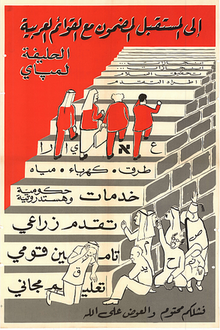Partai satelit Arab
Artikel ini sebatang kara, artinya tidak ada artikel lain yang memiliki pranala balik ke halaman ini. Bantulah menambah pranala ke artikel ini dari artikel yang berhubungan atau coba peralatan pencari pranala. Tag ini diberikan pada Oktober 2022. |
Partai satelit Arab, partai Arab atau partai satelit adalah partai satelit Arab Israel yang dibentuk untuk tujuan dukungan kampanye Mapai (dan kemudian Partai Buruh), Mapam dan Zionis Umum antara 1948 dan pertengahan 1970an.[1][2][3][4] Antara pemilu 1949 dan pemilu 1969, sebagian besar suara Arab Israel terbagi antara partai-partai komunis Maki dan Rakah (sebuah pecahan yang didominasi oleh Arab dari Maki pada 1965, diakui oleh Uni Soviet sebagai partai komunis resmi) dan partai-partai satelit Arab.[2] Menurut Rebecca Kook, Maki dan Rakah dianggap satu-satunya partai yang benar-benar mewakili kepentingan Arab sampai Partai Progresif untuk Perdamaian memenangkan dua kursi dalam pemilu 1984.[2]

 |
| Artikel ini adalah bagian dari seri Politik dan Ketatanegaraan Israel |
Daftar partai satelit Arab
sunting- Pertanian dan Pembangunan (Mapai)
- Partai Arab untuk Bedouin dan Penduduk Desa (Partai Buruh)
- Kerjasama dan Ikhwanul (Mapai, Partai Buruh)
- Kerjasama dan Pembangunan (Mapai)
- Partai Demokrat untuk Arab Israel (Mapai)
- Partai Demokrat Nazareth (Mapai)
- Blok Arab Populer (Mapam)
- Perjuangan dan Pembangunan (Mapai, Partai Buruh)
- Perjuangan dan Kerja (Mapai)
- Partai Arab Bersatu (Partai Buruh)
Referensi
sunting- ^ Uzi Rebhun & Chaim Isaac Waxman (2004) Jews in Israel: Contemporary Social and Cultural Patterns, University Press of New England, p356
"gradual decline in the electoral power of the Satellite lists, (i.e., smaller parties that align with a large party to form a bloc) until their final demise in the elections of 1984. The votes that had previously been given to those parties went either to Zionist parties or to the Communist Party and the newly formed Arab national parties." - ^ a b c Rebecca Kook: "For the first seven rounds of elections. most of the Arab votes were distributed amongst the Israeli Communist party (Maki later to become Rakach. later to become Hadash) and various Mapai and Mapam satellite lists. These were lists formed by the two main labor movement parties headed by Arab candidates. They were for all intents and purposes, however, extensions of the leading parties in terms of positions and coalition alignment. They are commonly described as satellite lists because of the patronage relationship between them and Mapai. The Israel Communist party, however, was long considered the only party to truly represent Arab interests until the appearance of the Progressive List for Peace (PLP) in 1984."; in Israel in Comparative Perspective: Challenging the Conventional Wisdom, edited by Michael N. Barnett, p.214
- ^ Kesalahan pengutipan: Tag
<ref>tidak sah; tidak ditemukan teks untuk ref bernamaAG - ^ Israel at the Crossroads, edited by Efraim Karsh, Gregory S. Mahler, p.157